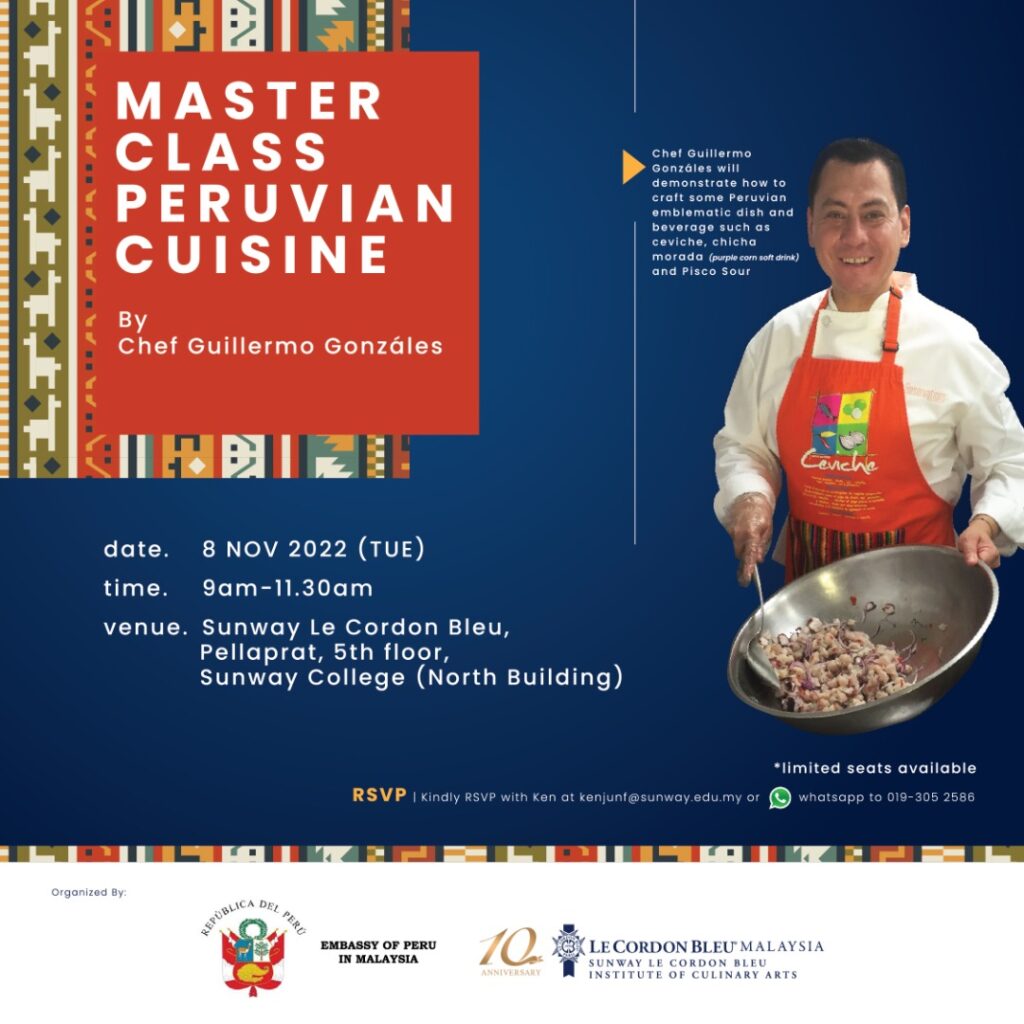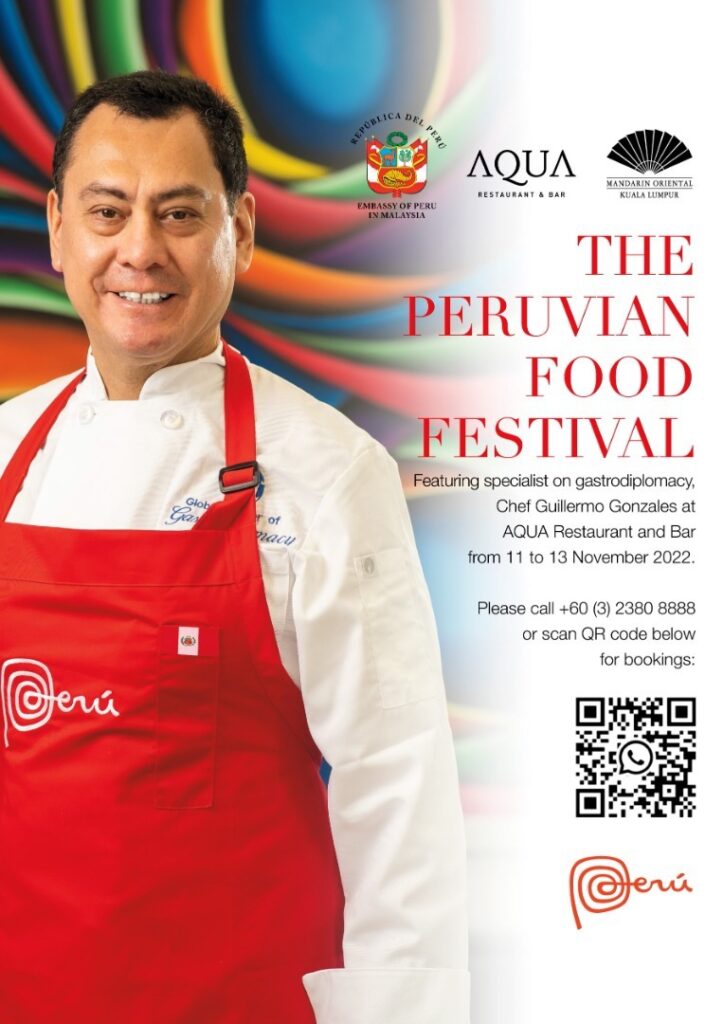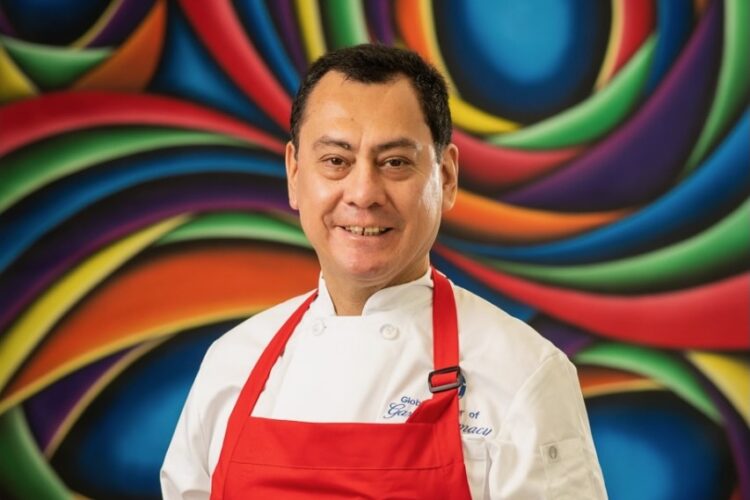Guillermo Gonzales
In this interview, Guillermo Gonzales, President of the Global Center of Gastrodiplomacy and Sustainable Development, shares some news about upcoming Peruvian gastronomy events in Kuala Lumpur and what his work entails.
What are you currently doing?
I am the President of the Global Center of Gastrodiplomacy and Sustainable Development, which promotes the concept of gastro-diplomacy with cooperation as a tool for improving commercial and cultural gastronomic exchanges between nations. We consider the importance of the economic chain of value of gastronomy, which begins with the farmers and fishers and ends in the food industry and restaurants to strengthen the country’s brand.
I am also the President of Embajador Publicaciones (Ambassador Publications), a book editorial specialising in the publication of institutional books and books about gastronomy.
Finally, I am the Hallbars Ambassador for Latin America and the Caribbean. Hallbars is an international institute that works in alliance with the Alfred Nobel Foundation in Sweden to promote and recognise the best sustainability reports from the private and public sectors in the world. (https://hallbars.org/about)
How did you get into the industry?
I was the Ambassador of Peru, my country, in Honduras between 2013 and 2016. During that period, with the support of the Foreign Affairs Ministry of Perú, I developed gastro-diplomacy with cooperation between Honduras and Peru. I founded the first Honduras-Peru Entrepreneurial Council, from which the commercial relations between both nations increased. We facilitated Peruvian Gastronomy Training Workshops, which benefited 1300 chefs from all over Honduras. We counted on the work of a professional Peruvian Chef as part of the Embassy team. We made alliances with local governments and the National Tourism Council of Honduras to perform our workshops in 95 per cent of the provinces of Honduras. As a result, we published the Gastrodiplomacy Manual, which got a Gourmand Prize in 2015.
Share with us a story from behind the scenes.
In October 2015, I participated in the Frankfurt International Fair, specifically in the Gastronomy Pavilion, presenting a stand exhibiting Hondurenisn and Peruvian products and the Gastrodipolmacy Manual book. At the same time, I was participating in the Best of the Best Gourmand Awards. When the prizing ceremony began, I knew that the Gastrodiplomacy Manual I published was a finalist. Still, a great surprise for me was that my name was called to the scene. I was the winner of the Embassies Category despite being a new publisher in the world of the gourmand prizes.
What food memory from your childhood or travels stands out?
I remember how my mother Amanda, who is still alive, cooked delicious homemade Peruvian recipes such as ceviche (marinated raw fish with lemon and chilli) and lomo saltado (sauteed meat with onions, fried potatoes, chilli and tomatoes).
I also remember my grandmother preparing Pachamanca and Sopa Verde( Green Soup), traditional recipes from our highlands in Perú.
During my childhood, my father took us to visit the north coast cities in Perú, where we tasted great Peruvian plates such as ceviche, green rice with marinated duck and seafood tortillas.
Thanks to my work, I have visited 93 countries and enjoy every opportunity to try local plates, especially in Asia.
What’s the best/ worst part of Guillermo Gonzales’ job?
The best part is connecting countries through gastronomy and showing the great value of original products used in traditional recipes.
The worst part is that I cannot reach as fast as I would like a big number of countries to promote gastrodiplomacy.
Guillermo Gonzales’ favourite food and beverage pairing?
Pisco sour and ceviche.
What’s one of the craziest things you’ve seen behind the scenes?
The craziest thing I may have seen behind the scenes during a culinary event was in the year 2016 in Yantai, China. I was working with an excellent Peruvian Chef to prepare the typical dish of pachamanca for an international dinner with around one hundred guests.
Pachamanca is usually prepared in an earth oven with hot stones – a hole in the ground. What happened was that the stones could not get hot enough because the garden hole in Yantai did not work due to a high level of humidity. As an emergency solution, we had to cook all the ingredients in big saucepans, keeping the recipe for marinating the meats.
The perfect day off would be…
Going to the Urubamba Valley in Cuzco in the Andes of Peru, where the famous Macchu Picchu ruins are located, tasting typical regional dishes there.
A day in the life in Gastrodiplomacy and as Peru’s Culinary Promoter is…
… visiting traditional food markets and talking with the sellers of diverse national products. Visiting nearby farmers and fishers to learn how the commercial aspect works and how they preserve their culinary traditions. Also, of course, there are meetings to prepare plans for organising gastronomic festivals.
What does Guillermo Gonzales do for fun?
Cook for my friends and family.
What would you like guests to know about Embajador Publicaciones (Ambassador Publications) and the Global Center of Gastrodiplomacy?
I would like them to know that we have a highly qualified team in both organisation and count with great alliances at the international level like the ones we have with the Gourmand Foundation and the Hallbars Institute for Sustainability.
How has the pandemic changed your perspective or the way you operate?
The pandemic has fortified my conviction to take each day as the best day of the year and consider any day to be the last one.
In the operation of the Center and of Embajador Publicaciones Editorial, we learned the benefits of virtual meetings and how fast we can work using time in the best way.
What do you want people to know about Gastrodiplomacy and being Peru’s Gastronomy Promoter as a profession?
You need to work hard to communicate the best part of your national culture using your country’s gastronomic richness and have a good capacity for communication and conferences to explain the benefits of gastrodiplomacy for the countries.
What practices do you currently implement or hope to implement to work towards social responsibility and sustainability in the future?
The training workshops our centre offers include the importance of the Sustainable Development Goals of the United Nations and its relationship with the use of original agricultural products in each country, promoting fair trade for farmers, fishermen and women.
The Embajador Publicaciones (Ambassador Publications) has a strong alliance with the Hallbars Institute for Sustainability based in Sweden, which specialises in selecting and giving annual prizes for the best sustainability reports from the private and the public sector all over the world. Together with the Global Center of Gastrodiplomacy, we are working with the Hallbars Institute on publishing the first book about the best practices of sustainability in Latin America and the Caribbean for the year 2023.
What can guests look forward to in the Cooking demonstration in Sunway Le Cordon Bleu and Peruvian Cuisine launch at the Mandarin Oriental this week?
Our guests can expect a great demonstration of Peruvian culinary arts, which is the expression of the richness of our gastronomy based on the traditions of our coast, our highlands and Amazonia.


Read more interviews similar to this one with Guillermo Gonzales here, and stay up to date with the latest food and beverage happenings in KL here.

